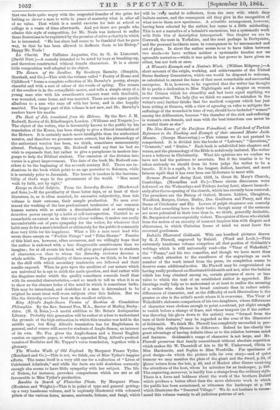literature, is, as is often asserted, its excessive subjectivity, then
this volume is their outcome, their sample production. No man over traced the working of the less predominant tendencies of our common human nature with so subtle a discrimination and so searching a detective power except by a habit of self-introspection. Carried to so remarkable an extent as in this very clever voldme, it makes one really uncomfortable out of pure sympathy for the writer, for whatever that habit may do fora man's intellect or ultimately for the public it commonly does very little for his happiness. What a life a man must lead who
wrote these essays on "Foolish Things" and "False Shame." Fancies
of this kind are, however, often erroneous, and we willingly hope that the author is endowed with a less disagreeable sensitiveness than we imagine ; for at all events his book will give great pleasure to students of character,-1 class to whom the Saturday reviewer devotes a whole article. The peculiarity of these essays is, we think, to be found in the skill with which secondary tendencies are followed and their results exposed. When he gets upon the qualities of our nature which are universal he is apt to shirk the main question, and deal rather with the disguises under which the quality sometimes conceals itself than with its essential characteristics,—not so much to toll ns what it is as to show us the obscure holes of the mind in which it sometimes lurks.
This may be intentional, and doubtless if a man is determined to bo original he must treat well-worn subjects after this fashion. But we like the Saturday reviewer best on the smallest subjects.






























 Previous page
Previous page